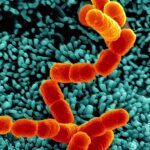Link to Pubmed [PMID] – 8781869
Eur J Appl Physiol Occup Physiol 1996;73(3-4):358-63
A hot and humid environment can be detrimental to race performance. Caffeine, on the other hand, has been shown to be an ergogenic aid for improving endurance performance. To examine the influence of caffeine ingestion on race performance during high heat stress, seven endurance trained competitive road racers aged between 23 and 51 years (five men, two women) performed three maximal effort 21-km road races outdoors in hot and humid conditions. The caffeine dose, randomly assigned in a double-blind fashion, consisted of either 0, 5, or 9 mg.kg-1 body mass. During each run, the subjects were allowed to drink water ad libitum at each 5-km point. Blood samples were obtained immediately before and after each run and analysed for changes in concentrations of Na+, K+, glucose, lactate, and hematocrit. Pre and postrun data were also collected for body mass and tympanic membrane temperature. Race times were not significantly different among the races or caffeine doses, with the average times within 1.1% of each other. In addition, none of the other variables measured varied significantly among the races or caffeine doses. In summary, caffeine intake did not affect race performance. Therefore it was concluded from our study that caffeine is not of ergogenic benefit in endurance races during high heat stress.

